6 Movie Details You Never Noticed That Reveal The Whole Plot
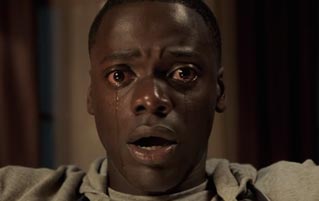
Most big-time filmmakers think "symbolism" means making a superhero occasionally pose like Jesus, or festooning the villain's outfit with sorta-kinda swastikas ("nawtstikas" is the industry term). But, every once in a while, the brain trust behind famous movies and shows take the more subtle approach, hiding the most mind-blowing secret messages in minuscule details you damn well didn't notice.
BEWARE: IMMINENT SPOILERS
Get Out -- The Phone Camera Flashes Are More Significant Than You Might Think
Get Out is an amazing film about how the greatest possible horror movie monster is just "white people." The story finds a creepy white family kidnapping and Being John Malkovich-ing black guests at their country estate -- as in, they steal young black dudes' bodies and reprogram them with old rich white farts' memories and personalities. In the end, our hero, Chris, realizes that the only way to temporarily de-program the parasite personality is with a camera flash, probably because old people's brains historically go on the fritz when confronted with newfangled phones.


As you know if you've attempted to teach your grandpa how to take a selfie.
While the internet was quick to point out that this plot twist is reminiscent of the "Itchy & Scratchy Land" episode of The Simpsons, it isn't just a gimmick -- it's the entire thesis of the movie. In Get Out, the only way to put a dent in the unjust incarceration/killing of black people is through a camera phone ... and isn't that what's actually happening in the world right now? Camera phones are being utilized to document police violence against African Americans. These ubiquitous cameras may discombobulate whatever hypno-brain surgery is going on in this movie, but they're also one of the few real defenses against systemic racism.
And it doesn't end there; the whole film is chock-full of heavily symbolic doo-dads. The trigger for Chris' hypnotic imprisonment is a silver spoon -- that is, a metaphor for wealth and privilege.


It's also a metaphor for cats and cradles and Little Boy Blue and The Man in the Moon.
Also, Chris resists the hypnotism by fashioning earplugs out of cotton he picks out of a chair. This is obviously a reference to slavery, but in a way it reverses that iconography by making the cotton an instrument of achieving freedom. This foreshadows what happens next: Chris proceeds to kill off his captors by weaponizing what director Jordan Peele calls "little pieces of whiteness," like Bocce and a taxidermy.



The original draft had the Bocce balls filled with mayo.
Then he takes off in a white '80s Porsche.

You know, as if a Porsche alone wasn't white enough.
Sadly, they seem to have cut the scenes where Chris flings Barry Manilow CDs like ninja stars and lures his attackers into a structurally unsound Olive Garden.
Logan -- Professor X's Crappy House Is One Big Depressing Metaphor
Other than society falling into ruin and Wolverine working in the service industry, one of the most depressing parts of Logan was poor Professor Xavier's digs -- he went from living in, essentially, the Playboy mansion, to holing up in a rusty, toppled-over water tower.

"Eh, when mankind fears you and hates you, Westchester County just ain't punk enough."
It seems like it's just an extra bummer that, in addition to coping with senility, Prof. X also has to contend with living like a cartoon hobo from the 1920s. However, in addition to the in-story explanation that the water tower is a way to contain his out-of-whack psychic powers, this is actually a coded reference to the earlier movies. The decrepit state of the water tower is cluing us into the Professor's mental state by visually referencing Cerebro, his private psychedelic IMAX theatre for peeping on other mutants.

"I call it 'Cerebro,' which is Latin for 'Porno-Sphere.'"
According to production designer Francois Audouy, the water tower was supposed to "feel like a strange fever-dream version of Cerebro" -- the movie is symbolically telling us that the once-powerful mutant is now a little rusty, but there's more to it than that. In addition to its large dome qualities, which are innately Cerebro-like, the water tower is full of holes, which "mimics the starfield you see in Cerebro."


It also mimics the overall plot of the X-Men franchise.
And here's where it gets almost unbearably poignant. Later in the movie, it's heavily implied that the elderly Prof. Xavier accidentally killed all of the X-Men, because that's what happens when your brain is a weapon and you forget how to use it. So, what we have is a reference to the lights of Cerebro, which represented mutants in the world, replaced by holes ... meaning there's nothing there anymore. Congratulations, movie about how our favorite superheroes get old and die: You're even sadder than we thought.
Lost -- A Freaking Candy Bar Predicts The Entire Course Of The Show
The TV series Lost had a lot of made-up products and companies throughout its run -- like Oceanic Airlines, the company that crashed one of its planes on an island full of murderous cultists and angry gas monsters, but somehow still seems preferable to United. One item that kept resurfacing was the fictional chocolate "Apollo" bar:

In real life, it was tragically driven to bankruptcy by the "Ivan Drago" candy bar.
Apollo, of course, is the Greek god of sunshine and prophecy. That's not a coincidence, since the scenes with this candy bar actually foreshadow the entire course of the show. Believe it or not, the candy bar is a metaphor for the island's magic.
The final season finds the castaways discovering that they've been brought to the island as candidates to take over from the mysterious Jacob as the place's immortal protectors. Yeah, the whole thing is basically like Willy Wonka, so it's only fitting that a candy bar should be so integral here. Eventually, Jacob anoints boring angsty doctor Jack as his successor.


"I chose you because we're basically first-name buddies."
Remembering that these candy bars are a metaphor for the island, think back to the penultimate season. When we first meet Jacob in a flashback, he's handing over an Apollo bar to Jack.




It takes an ancient magical being to retrieve stuck candy from a vending machine.
By the end, when it seems pretty clear that Jack's going to kick the bucket, he hands the island over to Hurley. Good ol' Hurley then decides to share the responsibility with not-so-good ol' Ben Linus, which is a pretty unexpected twist -- unless you remember the scene in Season 4 when Hurley gets his mitts on an Apollo bar and gives half to Ben.

Ben then fashions a knife out of the nougat and stabs five people to death with it.
Most pointedly, the candy bar also appears in the controversial final episode. In the glowy-extra-dimensional-afterlife-place, Sawyer is having trouble getting an Apollo bar out of the vending machine through brute force, or even Southern charm ...


... So, Juliet suggests he unplug it, which totally works.
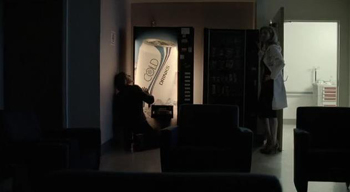
They cut the montage where Sawyer, using his homespun wiles, bangs the vending machine.
And later on, how do they fix the island? They pull out the stone plug from that radioactive urine pool ...
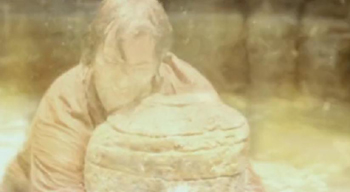

... and then plug it back in. The island is suddenly well again, because apparently world-saving magic ponds work under the same principles as old internet modems.
The Witch -- Some Corn On The Cob Might Mean The Family Was Tripping Balls Throughout The Movie
The Witch was the slow-burn of a horror flick about the devil infiltrating a New England family and seducing a young daughter into witchcraft, partly through an evil talking goat named Black Phillip. Amazingly, the script somehow got made without any executives reworking it as an Air Buddies-like comedy about a sassy goat who can play soccer thanks to the Prince of Darkness.

"This summer, Jack Black goes baaaaaaa-ck to the 17th century!"
In the movie, the family exile themselves from society for religious reasons, and then their devil-related paranoia slowly turns them against each other. It's clearly a metaphor for the pernicious effect of irrational religious hysteria, but also, if you stick it out to the end, there's totally a whole bunch of witches in those woods. So the crazy zealots were, uh, right?
Well, one tiny detail may actually be the key to figuring everything out: the family's shitty corn. Early on, we see that their crops aren't exactly screaming "This family's gonna get rich and change their name to 'Redenbacher' by the end of the movie."


"Son, this corn sucks so much, we shall spell it with a 'k' and flip the 'r' around."
Historians and connoisseurs of getting super-fucked-up in weird-ass ways may have noticed that the crops are besieged by ergot, a hallucinogenic fungus -- which is significant because ergot poisoning may have been behind the hysteria of the Salem Witch Trials.
While the director, Robert Eggers, hasn't come forward and cleared up exactly what's true and what's not, he has confirmed that it is indeed ergot on the corn. He even seemed to point out in a Reddit AMA that you shouldn't accept everything you see in the movie, while again bringing up the ergot:
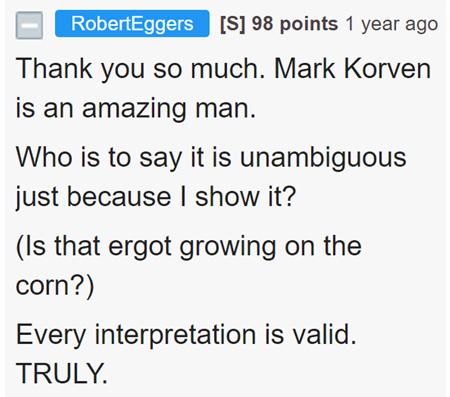
There you have it: Our theory that this is a prequel to Hocus Pocus is also valid, technically.
So that one shot might mean that all of the black magic and witchiness we see in the film are all because that family is unknowingly tripping balls. Which seems plausible -- try taking peyote at a petting zoo and see if you don't encounter a Black Phillip or two.
It Follows -- A Photo Reveals The Movie's Not An STD Allegory, It's About Your Goddamn Parents
It Follows was a breakout horror film about a sexually transmitted shapeshifter demon, not unlike a cross between the work of Stephen King and the clap. While the STD allegory seems pretty obvious, there's something else going on here. When the shapeshifting monster appears the final time, it's in the form of a bearded guy who seemingly got lost on his way to take a midnight leak.

Whoa, what special effects!
Then, in the film's final moments, we see the same face in a photo -- it was the main character's dad, who's conspicuously absent throughout the movie, either because he's dead, or in jail, or trapped forever inside the Wes Anderson movie in which said photo was taken.


If you stare at that photo long enough, The Kinks' entire discography will start booming from the heavens.
Similarly, one of the other big deaths in the movie finds one of the characters being offed by the monster, who's taken the form of his own half-naked mom.

Who, seriously, humps him to death.
So, like, is the whole film about parents? Maybe it's about the fears of becoming an adult through sex -- and who isn't afraid of ending up like their folks? The very first shot of the movie is literally a girl running away from her parents' house. Also, when we first meet our protagonist Jay, pre-losing her virginity, she's housed in the safety of a very womb-like swimming pool:

Her mom had a slight weight problem.
And when the protagonists make up a wacky plan to electrocute the monster in another swimming pool, they're essentially trying to abdicate adulthood by retreating to the metaphorical (and likely pee-filled) womb of the swimming pool. Of course, the plan doesn't really work -- there's no way to not become an adult. And besides, it's too late for them anyway, as the sex scenes made clear.
Some have also theorized that Jay's mysteriously not-talked-about dad was abusive to her, making this theme all the more horrifying -- and perhaps reframing the story as an attempt to use sex and horror to put viewers in the emotional mindset of an abuse survivor. The movie ends with the two characters, now in a sexual relationship, with the ever-present specter of their parents' decisions lurking behind them. *Shudder*

This explains why the final dialogue is the two arguing about whether they should go to Applebee's or turn in early.
La La Land -- The Costume Colors Tell You What Each Scene Really Means
La La Land tells the story of a struggling actress and a jazz musician who can't make their relationship work because they just keep getting too many high-paying jobs -- hell, they could have thrown a goddamn Terminator in the mix, and this story wouldn't be any less realistic.
But while you were all losing yourself in Ryan Gosling's eyes, you may have overlooked something: The costume changes in La La Land are hugely significant. Specifically, the colors of the wardrobe forecast the emotional core of the scene. For instance, blue is creativity -- more specifically, creative success. It's the color associated with Mia landing auditions:


And with the Hollywood legends she looks up to as she passes a mural ...

... And Sebastian's club at the end? Yup, bluer than Tobias Funke's ballsack:

We always wondered why this scene suddenly takes place in planet Pandora.
Yellow represents change; it's the color of Mia's dress when she first falls for Seb, as they soft-shoe around all the dog crap and used condoms likely littering that public road.
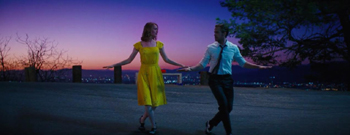
Also yellow: urine. It all fits.
And when John Legend offers Seb a job in his band, he's wearing a mustard-colored turtleneck, presumably after candlestick-ing Prof. Plum's brains in.

There's a thin line between "successful jazz musician" and "substitute art teacher."
Red represents the crushing blow of reality. It's the color of a jacket during a shitty audition ...

... And it's a red stool on which Seb signs the contract to join the band he doesn't want to join ...

Red in your stool is always cause for concern.
And at one point, Ryan Gosling is completely dressed in red ...

... Just to further underscore the abject indignity of making a few bucks playing A Flock of Seagulls covers on the keytar.
You (yes, you) should follow JM on Twitter, or check out the podcast Rewatchability.
Hey, here's La La Land! Go La La f**k yourself if you don't like it.
Also check out 6 Mind-Blowing Bits of Foreshadowing in Famous TV Shows and 6 Minor Details That Reveal Major Things About Movie Worlds.
Subscribe to our YouTube channel, and check out 10 Easter Eggs You Never Noticed In Your Favorite Shows, and other videos you won't see on the site!
Follow us on Facebook, and we'll follow you everywhere.
Nightmarish villains with superhuman enhancements. An all-seeing social network that tracks your every move. A young woman from the trailer park and her very smelly cat. Futuristic Violence and Fancy Suits, a new novel about futuristic shit, by David Wong.
